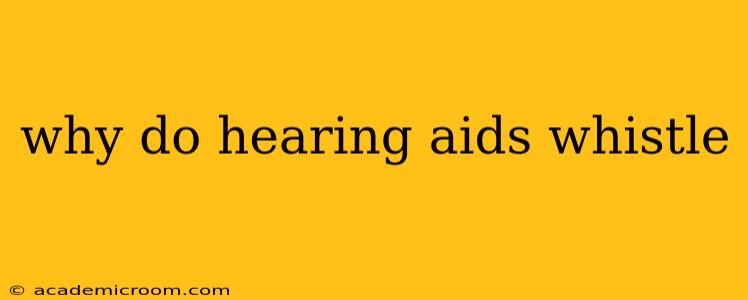Hearing aids are remarkable devices that amplify sound, helping millions regain access to the auditory world. However, one common and frustrating problem is whistling, also known as feedback. This high-pitched squeal can be incredibly annoying and even painful. Understanding why hearing aids whistle is crucial to resolving the issue and enjoying the benefits of improved hearing.
This article delves into the science behind hearing aid whistling, exploring common causes and offering practical solutions. We’ll also address frequently asked questions surrounding this prevalent issue.
What Causes Hearing Aid Whistling?
Hearing aid whistling occurs when sound amplified by the hearing aid leaks out of the ear and is picked up by the microphone. This amplified sound then gets re-amplified, creating a positive feedback loop resulting in the characteristic squeal. Think of it like a microphone too close to a speaker – the sound creates a continuous, escalating loop.
Several factors contribute to this feedback loop:
- Poor fit: A poorly fitting hearing aid leaves gaps between the device and the ear. This gap allows sound to escape and be picked up by the microphone, leading to whistling. This is perhaps the most common cause.
- Earwax buildup: Wax accumulating in the ear canal can create a barrier, affecting the proper seal of the hearing aid and causing feedback. Regular ear cleaning is essential.
- Incorrect settings: Improperly adjusted volume or amplification settings can significantly increase the likelihood of whistling. An audiologist's professional adjustment is key.
- Damaged or malfunctioning hearing aid: A damaged component, such as a faulty microphone or receiver, can contribute to feedback.
- Type of hearing aid: While all types of hearing aids are susceptible, certain styles, such as behind-the-ear (BTE) models, might require more precise fitting to minimize the risk of whistling.
- External factors: Strong winds or loud noises near the microphone can sometimes trigger whistling, though this is less frequent.
What are the signs of a poorly fitting hearing aid?
A poorly fitting hearing aid can manifest in several ways, going beyond just whistling:
- Discomfort: The hearing aid feels loose, uncomfortable, or even painful in the ear.
- Frequent falls: The device is constantly falling out or feeling insecure in your ear.
- Muffled or distorted sounds: The amplified sound doesn't feel natural or clear, suggesting an inadequate seal.
- Intermittent whistling: The whistling might come and go, indicating a fluctuating seal.
How can I prevent my hearing aid from whistling?
Preventing whistling requires a multi-pronged approach:
- Ensure proper fit: Regular check-ups with your audiologist are critical for ensuring your hearing aid fits correctly. They can adjust or replace ear molds as needed.
- Maintain ear hygiene: Keep your ears clean and free of wax buildup. Use only approved cleaning methods recommended by your audiologist. Never use cotton swabs.
- Follow your audiologist's instructions: Adhere to their recommendations regarding volume settings and usage.
- Regular maintenance: Have your hearing aid checked regularly to identify and address any potential problems early on.
- Be aware of environmental factors: In windy conditions, you may need to temporarily adjust the volume to minimize whistling.
Can I fix a whistling hearing aid myself?
While you can try some basic troubleshooting (such as cleaning the ear mold), it's generally not recommended to attempt major adjustments yourself. Incorrect adjustments could damage the device or worsen the problem. Always contact your audiologist if your hearing aid is whistling persistently.
What should I do if my hearing aid continues to whistle?
Persistent whistling despite troubleshooting indicates a more significant issue. Contact your audiologist immediately. They can diagnose the problem and provide appropriate solutions, which might involve adjustments, repairs, or replacement.
Why is my hearing aid whistling only sometimes?
Intermittent whistling often suggests an inconsistent seal between the hearing aid and your ear. This could be due to fluctuating earwax buildup, minor shifts in the hearing aid's position, or changes in the external environment. Again, consulting your audiologist is crucial.
By understanding the causes of hearing aid whistling and taking proactive steps to address potential issues, you can maximize your hearing aid's effectiveness and enjoy clear, comfortable sound. Remember, regular professional maintenance is essential for optimal hearing health and device performance.
